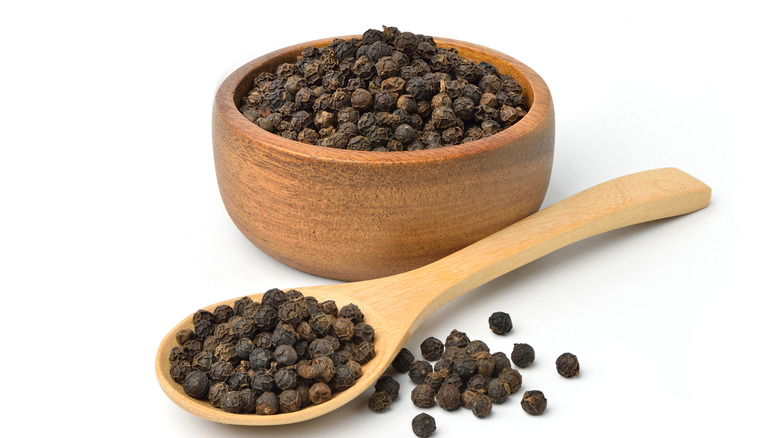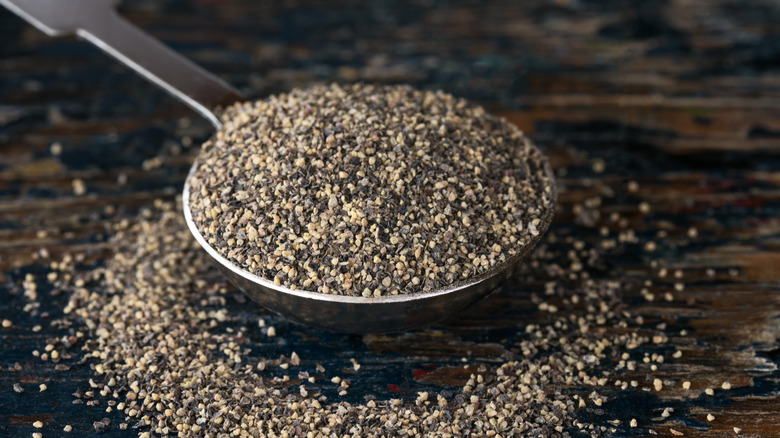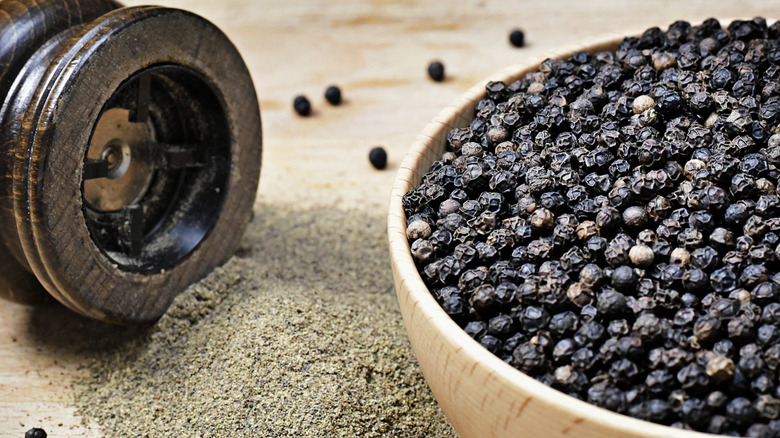The Science Behind Why Black Pepper Is Such An Instrumental Spice
Black pepper seems to be a requirement in most recipes, whether you're making baked beans or turkey. In fact, black pepper is so common a spice that waiters at certain restaurants may even as if you would like them to grind your pepper for you. Needless to say, there seems to be a lot of excitement over something that you most likely keep in a shaker next to your salt on the kitchen counter.
The popularity of black pepper dates back as far back as the fourth century when the spice was introduced to the western world following the military conquests of Alexander the Great (via McCormick Science Institute). Black pepper was seen as an incredibly valuable resource, to the point that this "black gold" was even used as a type of currency or a symbol of enormous wealth and high status. While black pepper's reputation as a luxury item eventually faded around the seventeenth century, as new culinary ingredients like chocolate, coffee, and other spices became more prominent (via World History), pepper still remains a very common and widely used ingredient in many countries around the world.
But why is that? What is it that makes pepper so important that it's included in an enormous amount of recipes? Is it just because pepper is so widely available it has to be used in everything — or is there something more to this ground black powder? The answer lies in science.
Black pepper enhances your tasting ability
What exactly do we mean by black pepper enhancing your ability to taste food? Does that mean that putting a lot of pepper on your food makes it somehow taste better? In a way, that's actually correct: Black pepper can make food taste better, or at least makes us think so.
According to America's Test Kitchen, black pepper has the unique ability to "stimulate your salivary glands," which, in turn, helps you to savor more flavors than you usually would. Just bear in mind that it needs to be freshly ground, not preground, as its scent starts to fade immediately, and it's the scent you need.
How does this work? The American Chemical Society tells us that saliva, while mostly water, contains proteins that can bind to both flavor compounds in foods and taste receptors on your tongue. Although the old stereotype of drooling when you smell good food is just something you'd see in cartoons, the idea that your saliva helps you to taste more isn't too far-fetched. Think of it as the saliva helping the food to stick to your tongue, allowing you to taste more of the different flavors in that piece of food. Black pepper encourages more saliva production, thus allowing more food to be "bound" to your taste buds.
But while a sprinkle of black pepper on your filet mignon or your soup may help you to savor more of those flavors, could it be that pepper may also have some other added bonuses aside from its culinary properties?
It's more than a flavor enhancer
Black pepper has mainly been used for its flavor, but it may surprise you to learn that this widely-used spice actually has a few health benefits to it. In fact, some cultures have used black pepper, among other spices, as a natural source of medicine.
According to the Nyam Center for History, pepper was used as a herbal treatment going back as far as 6,000 B.C. One of the natural medicines black pepper was used in was for problems involving gastrointestinal maladies, which involved a combination of black pepper, "long pepper," and ginger. The ancient Greeks, Romans, and Indians also praised pepper's ability to help with digestive issues, noting that black pepper helped the body process hard-to-digest foods.
Mederi Center also explains that black pepper is also used in Chinese medicinal practices where it is studied for benefits in one's mood and cognitive function. Black pepper is also being studied for its supposed cancer prevention abilities — although more research into this claim is still ongoing. Cleveland Clinic again lists several benefits of black pepper, such as being an antioxidant, anti-inflammatory, and enhancing other nutrients.
While black pepper may not be a superfood, nor does it require you to consume large amounts of it per day, it may not hurt to put some fresh black pepper on your next dish — at least for the sake of extra flavor.


